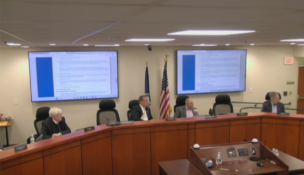House Republicans retain law firm that says governor can’t expand Medicaid on his own
House Republicans retain law firm that says governor can’t expand Medicaid on his own
The battle between House Republican leaders and Gov. Terry McAuliffe over Medicaid expansion in Virginia took a legal turn Wednesday, with Republican leaders touting a legal analysis and threatening to go to court to challenge the governor if he tries to expand Medicaid without the consent of the General Assembly.
Virginia House of Delegates Speaker William J. Howell (R-Stafford) and other leaders held a press conference to release an analysis done by two partners of a Washington, D.C.-based law firm known for its expertise in constitutional law and corporate governance.
“There is no unilateral authority for the governor to do this expansion,” said Paul D. Clement, a partner with Bancroft PLLC and a former U.S. Solicitor General under President George W. Bush “The Supreme Court has made clear … that states have an option as to whether or not to expand Medicaid. For each state, the state constitution dictates the answer on how to go about an expansion. In Virginia, the power to expand Medicaid lies with the legislative branch.”
Clement was referring to the appropriation of federal funds to expand eligibility for coverage under the Affordable Care Act. He made his remarks during a press call with the media in which Howell revealed that the Republican leadership paid $25,000 to retain Bancroft for the analysis and any possible future legal action. Howell said the money came from funds under control of the House Clerk’s Office.
“Unfortunately we can’t go to the Attorney General for help, because he’s said he’s going to do what he can to make the Medicaid expansion work,” Howell said.
Attorney General Mark R. Herring retained University of Virginia law professor A.E. Dick Howard last month to advise his office on issues relating to the budget and Medicaid expansion. Howard is the principal author of the 1971 revision of the state Constitution.
After months of a political standoff between the governor and House Republicans over McAuliffe’s desire to expand Medicaid, the Assembly adopted a long awaited state budget on June 12, averting a government shutdown that would have been triggered on July 1 had a budget not passed.
McAuliffe signed the two-year, $96 billion budget last week. He said Friday that he would attempt to bypass the Assembly to expand health coverage to an estimated 400,000 Virginians who are not eligible for Medicaid, but did not say how he would go about it.
Brian Coy, a spokesman for the governor’s office, said Wednesday that McAuliffe, Bill Hazel, secretary of health and human resources, and their teams are working on a way forward to use the governor’s authority to expand access to health care for Virginians who need it. “We have made no announcements about what shape that action may take because we have not yet decided. The governor will not, however, take any action that is not well within the authorities that the voters entrusted to him when they elected him last November.”
Coy added that “it would be premature and ridiculous to speculate or prepare to oppose an action that hasn’t even been announced or taken yet. Virginians deserve leaders who are more focused on expanding health coverage than they are on lawyering up just in case they need to sue to keep their constituents from getting lifesaving care.”
Howell described McAuliffe’s actions as “nothing less than an executive power grab that’s very concerning to me and other members of the legislature. We are prepared to challenge the governor through the courts.”
While governors have expanded Medicaid in other states, Kentucky and Ohio, without the express approval of the legislature, Clement noted those actions were taken under a framework different from Virginia's law and constitution.
Asked if his legal analysis would hold true for all funds coming into the state, including federal funds or monies from public/private partnerships, Clement said yes. “It does extend to various arrangements whether it’s state or federal government, partnerships — all those go through the legislative process,” he said.
Clement wrote the analysis with fellow law partner, Erin Murphy, another experienced Supreme Court attorney.
It says, “Nothing in Virginia statutory or constitutional law empowers the governor to make that decision unilaterally, let alone to execute that decision without the requisite appropriation of funds from the General Assembly. There is simply no constitutional path for the governor to expand Virginia’s Medicaid program without obtaining the requisite authority and appropriation of funds from the General Assembly to do so.”
e


















